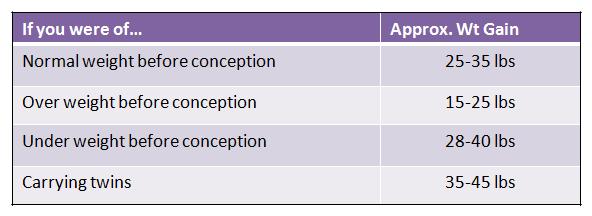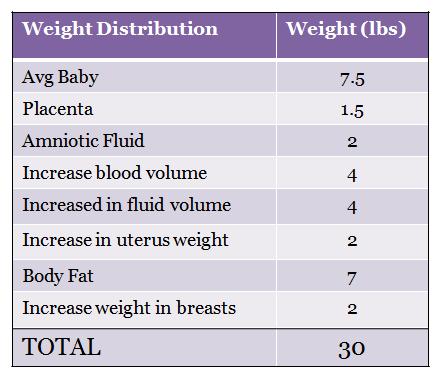|
Pregnancy Weight Gain CalculatorA pregnancy weight gain calculator is meant to provide you with a little guidance when it comes to watching those numbers on the scale start to creep up. It’s kind of funny that the weight we work so hard to shed pre-pregnancy is so essential to the growth and health of our baby while we are pregnant. This is definitely not a time to cut calories in an effort to squeeze into those skinny jeans. Having said that, this isn’t a time to start eating for two either. Weight Gain Guidelines The ACOG determines your recommended weight gain during pregnancy based on your BMI(Body Mass Index). Your BMI is calculated by assessing body weight in comparison to height. The BMI calculator helps determine if you were underweight, normal weight, overweight or obese before conception. Take note, BMI doesn’t account for muscle mass. So, discuss your numbers with your doctor. 3 Easy Steps...
Remember, these are only guidelines. However, gaining too much weight can cause problems during delivery and difficulty with weight loss post-pregnancy. Gaining too little weight increases the risk of a low birth weight baby (5.5lbs or less). These babies have an increase risk for development difficulties and health issues. Source: ACOG. The pregnancy weight gain calculator formula is based on your current size and weight and whether you are underweight, overweight, or normal weight. IMPORTANT: Again, a pregnancy weight gain calculator is only an estimate. Each person and pregnancy is unique. Please talk to you doctor about your weight gain guidelines. Where does all this weight come from? The average baby only weights 7.5lbs. So where does the remaining 20 plus pounds come from?
When should I start to gain weight? Most women only gain 2-4 pounds during those first 13 weeks of pregnancy (1st trimester). From there on out, count on about one pound every week until you deliver. Remember, you only need an extra 300 calories a day during pregnancy. This caloric increase isn’t usually essential until the 2nd trimester when estrogen levels start to increase in blood stream acting as an appetite stimulant. Bottom Line So, being pregnant isn’t a green light to throw your healthy eating habits to the wayside and frequent Taco Bell until they know you by name. I know too many people that see pregnancy as an opportunity to eat all the things they wished they could’ve when they were trying to fit into their “skinny jeans”. That couldn’t be the furthest from the truth. Did you know a developing fetus produces 100,000 brain cells each and every minute? That is amazing! That kind of growth needs quality nutrients and a donut isn’t going to cut it. So, while you shouldn’t restrict your calories, use your them wisely, the health and growth of your baby depends on it.
Leave Pregnancy Weight Gain Calculator for Real Moms Real Fit home page
|







